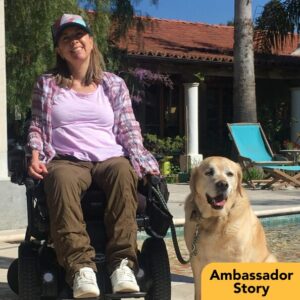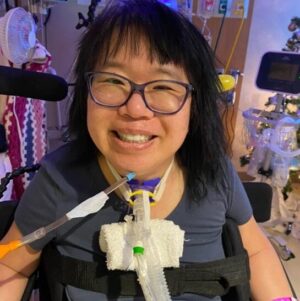In 2014, Debra Brock was facing chronic renal failure after a 30-year battle with insulin-dependent diabetes. A mother of three, grandmother of six and great-grandmother of five, Debra knew she wouldn’t be able to continue supporting her family without a kidney transplant. That’s when family friend Amy Krontz made an incredible decision: she started the process of becoming a living donor for Debra, a woman she had never met.

How are you and Debra connected?
Amy: Debra’s sister and I had worked in some volunteer groups together, which is how I found out that she needed a donor. We did not meet until I received final approval to be her living kidney donor.

Living donor Amy with Deb Brock
What made you decide to donate to someone you didn’t know?
Amy: Debra’s sister posted on Facebook about their family’s need to find a kidney donor and that they were fundraising with HelpHOPELive. I recalled the pictures and posts that expressed Debra’s importance as the primary matriarch in a very close and involved family. I was particularly moved by her role in her grandchildren’s lives. I realized that such a positive, loving influence would be a tragic loss. Once I found out that Debra had gone through dramatic weight loss and had taken measures to control her diabetes but that her kidney damage was still too severe to reverse, I wanted to try to help.

Deb is the “matriarch” of her family, says Amy
What were the preparations like?
Amy: I was tested beginning in February 2014 and I donated in August 2014. I had a few blood draws, a 24-hour period of urine collection and a 3-hour glucose test. I also took part in an educational appointment in which I was thoroughly informed about the procedure, including what to expect and all of the possible complications related to living donation.
What would have happened if Debra didn’t get a kidney?
Amy: Debra would likely still be on daily dialysis and would be experiencing complications with not just her kidneys but with other organ systems by now.
Debra: I would have continued with dialysis and prayed for more time to look for donors. Before Amy donated her kidney to me, every day I was faced with death.

“Every day I was faced with death” before the transplant, says Deb
How did the gift of life impact your health?
Debra: The big difference is, I feel terrific! I actually enjoy going to the bathroom now because of my improved kidney function. I have freedom to plan activities with my family and not worry about bringing along my dialysis equipment.
Amy: The procedure was easier to endure than I had imagined. I was well-informed and experienced less post-operative pain and recovery than I had initially anticipated. The risks involved in being a living donor are very small, and making some healthy lifestyle changes has helped me to avoid any complications. A little bit of my time and minor pain for a couple of weeks afterward were small sacrifices to enrich and extend the life of another.
Ultimately, my life has not been compromised in any way living with one kidney. Living donation vastly improves the chances of a successful transplant compared to deceased donor outcomes. If I had more kidneys to give, I would do it all over again, and I strongly encourage others to consider it as well.

The gift of life has helped Deb return to her life with family and “new babies”
Amy, did fundraising provide you assistance as a living donor?
Amy: I was an unemployed nursing student when I donated. I was reimbursed for mileage and travel for testing and appointments related to the donation.
Debra, why do you fundraise with HelpHOPELive?
Debra: My kidney transplant social worker gave me materials to review, and I chose HelpHOPELive because of the reviews I read. I had enough concerns on my mind as I was preparing for the transplant, and HelpHOPELive eliminated my worries about money. Today, I fundraise for prescriptions, travel expenses for post-care treatment and funds in case any medical emergencies take place.

Deb and her family fundraise for ongoing post-transplant costs
Do you share a special bond today?
Amy: Most definitely. We remain in contact and I am very grateful for the experience and for Debra’s appreciation for each new day. The choice I made to become her donor is reaffirmed consistently through my interactions with Debra and her family.
Debra: Amy and I share a bond that is not comparable even to a sister or your best female friend. She has given me a part of her. She has given me life. She has given me more time to spend with my family. I love her.
Debra, what does hope mean to you?
Debra: Hope means that there is a tomorrow!
 Want to make a difference in the lives of kidney transplant recipients and living donors? Make a donation to the HelpHOPELive General Operating Fund today and help us support community-based fundraising campaigns for families.
Want to make a difference in the lives of kidney transplant recipients and living donors? Make a donation to the HelpHOPELive General Operating Fund today and help us support community-based fundraising campaigns for families.
In 2014, Debra Brock was facing chronic renal failure after a 30-year battle with insulin-dependent diabetes. A mother of three, grandmother of six and great-grandmother of five, Debra knew she wouldn’t be able to continue supporting her family without a kidney transplant. That’s when family friend Amy Krontz made an incredible decision: she started the process of becoming a living donor for Debra, a woman she had never met.

How are you and Debra connected?
Amy: Debra’s sister and I had worked in some volunteer groups together, which is how I found out that she needed a donor. We did not meet until I received final approval to be her living kidney donor.

What made you decide to donate to someone you didn’t know?
Amy: Debra’s sister posted on Facebook about their family’s need to find a kidney donor and that they were fundraising with HelpHOPELive. I recalled the pictures and posts that expressed Debra’s importance as the primary matriarch in a very close and involved family. I was particularly moved by her role in her grandchildren’s lives. I realized that such a positive, loving influence would be a tragic loss. Once I found out that Debra had gone through dramatic weight loss and had taken measures to control her diabetes but that her kidney damage was still too severe to reverse, I wanted to try to help.

What were the preparations like?
Amy: I was tested beginning in February 2014 and I donated in August 2014. I had a few blood draws, a 24-hour period of urine collection and a 3-hour glucose test. I also took part in an educational appointment in which I was thoroughly informed about the procedure, including what to expect and all of the possible complications related to living donation.
What would have happened if Debra didn’t get a kidney?
Amy: Debra would likely still be on daily dialysis and would be experiencing complications with not just her kidneys but with other organ systems by now.
Debra: I would have continued with dialysis and prayed for more time to look for donors. Before Amy donated her kidney to me, every day I was faced with death.

How did the gift of life impact your health?
Debra: The big difference is, I feel terrific! I actually enjoy going to the bathroom now because of my improved kidney function. I have freedom to plan activities with my family and not worry about bringing along my dialysis equipment.
Amy: The procedure was easier to endure than I had imagined. I was well-informed and experienced less post-operative pain and recovery than I had initially anticipated. The risks involved in being a living donor are very small, and making some healthy lifestyle changes has helped me to avoid any complications. A little bit of my time and minor pain for a couple of weeks afterward were small sacrifices to enrich and extend the life of another.
Ultimately, my life has not been compromised in any way living with one kidney. Living donation vastly improves the chances of a successful transplant compared to deceased donor outcomes. If I had more kidneys to give, I would do it all over again, and I strongly encourage others to consider it as well.

Amy, did fundraising provide you assistance as a living donor?
Amy: I was an unemployed nursing student when I donated. I was reimbursed for mileage and travel for testing and appointments related to the donation.
Debra, why do you fundraise with HelpHOPELive?
Debra: My kidney transplant social worker gave me materials to review, and I chose HelpHOPELive because of the reviews I read. I had enough concerns on my mind as I was preparing for the transplant, and HelpHOPELive eliminated my worries about money. Today, I fundraise for prescriptions, travel expenses for post-care treatment and funds in case any medical emergencies take place.

Do you share a special bond today?
Amy: Most definitely. We remain in contact and I am very grateful for the experience and for Debra’s appreciation for each new day. The choice I made to become her donor is reaffirmed consistently through my interactions with Debra and her family.
Debra: Amy and I share a bond that is not comparable even to a sister or your best female friend. She has given me a part of her. She has given me life. She has given me more time to spend with my family. I love her.
Debra, what does hope mean to you?
Debra: Hope means that there is a tomorrow!
 Want to make a difference in the lives of kidney transplant recipients and living donors? Make a donation to the HelpHOPELive General Operating Fund today and help us support community-based fundraising campaigns for families.
Want to make a difference in the lives of kidney transplant recipients and living donors? Make a donation to the HelpHOPELive General Operating Fund today and help us support community-based fundraising campaigns for families.











